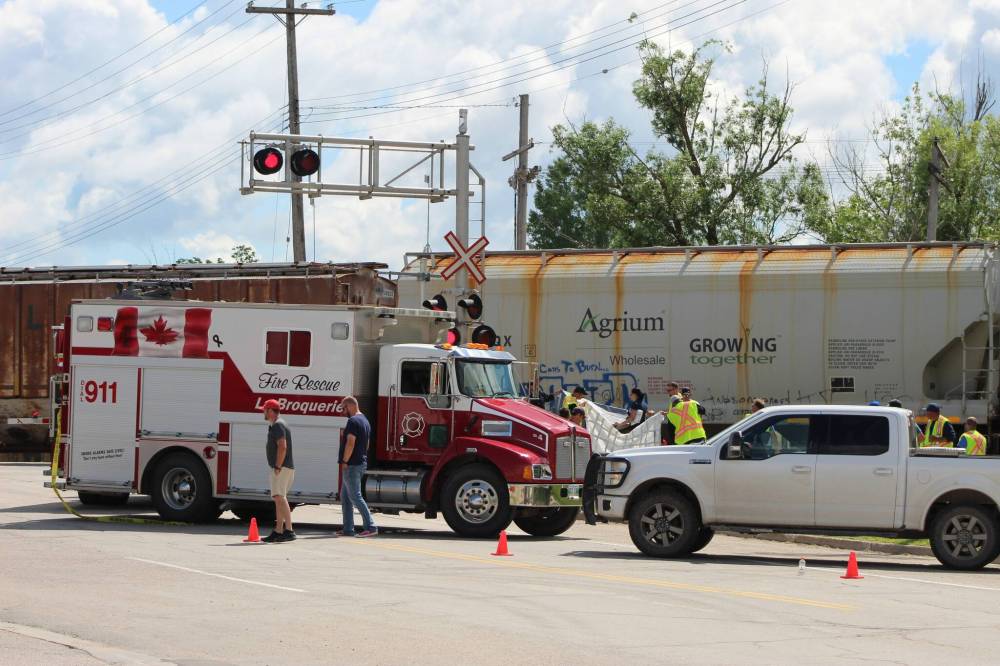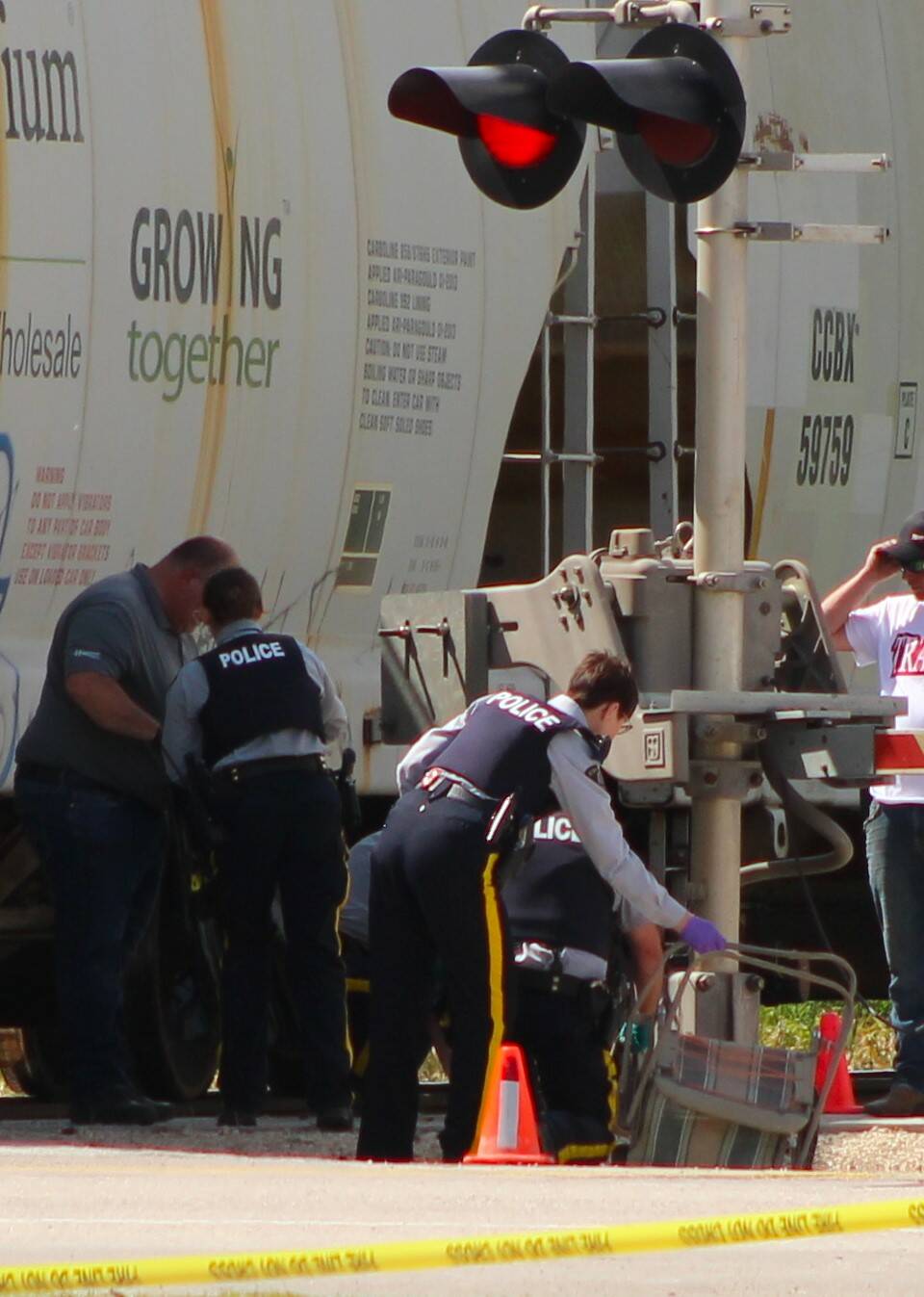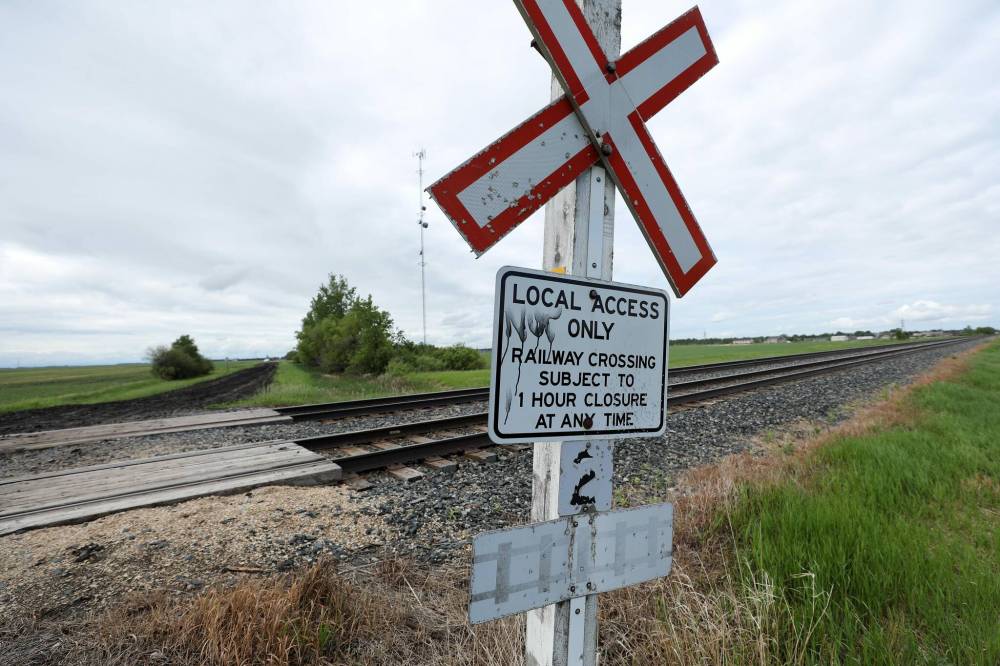It takes about 800 metres — four-fifths of a kilometre — to bring a train travelling 60 km/h to a full stop.
So there was no hope when three manure trucks slowly moving through a level crossing east of Portage la Prairie came into view for the veteran railway engineer and the conductor with just two years on the job who were making a routine run from Brandon to Winnipeg in June 2018.
“I yelled at (the conductor), ‘Those trucks don’t look like they’re slowing down!’” said the now-retired engineer, who didn’t want to be identified.
The first two trucks made it across. The driver of the third appeared to stop briefly, but, inexplicably, made the catastrophic decision to move forward.
The driver was killed in the easily preventable collision. A passenger somehow survived.

Chris Gareau / The Carillon
Emergency crews examine the scene after a woman was fatally struck by a freight train at a railway crossing in La Broquerie Sunday, June 24, 2024. The woman has been identified by family and friends as Ida St. Vincent.
The engineer didn’t work for three weeks afterward, receiving counselling during that time provided by his employer.
When he returned, any sort of close call on the rails led to anxiety.
“That crossing always bothered me after that,” he said. “I would say a silent prayer because I would always see flowers and a cross there.”

CHRIS GAREAU / THE CARILLON
Steinbach RCMP remove a lawn chair from the train accident scene that claimed pedestrian Ida St. Vincent’s life during the Ste Jean Baptiste parade in La Broquerie June 23.
He said such incidents are devastating for rail workers.
“It’s very traumatic for the engineer and the conductor,” he said, adding he retired in 2022 after 42 years with the railway.
“The crew is hurting a lot… you don’t go to work with this in mind — not like a policeman or fireman where every day is dangerous.”
Across Canada, 25 people had been killed in railway-crossing or trespassing incidents on railway property as of May 31, according to Operation Lifesaver, a partnership safety initiative of the Railway Association of Canada and Transport Canada that works in co-operation with the rail industry, government, police, unions and other organizations and community groups.
Since then, at least two more people have been killed in Manitoba, including an incident in La Broquerie, east of Steinbach, where a 78-year-old woman was fatally struck by a freight train during a parade in June.
Four people were killed in crossing or trespassing incidents in Manitoba in 2023, an increase from two in each of 2022 and 2021.

Cécile Bardon, a psychology professor at Université du Québec
A 2019 study from the Université du Québec à Montréal reported that on average, railway engineers — usually promoted from the ranks of conductors — experience four fatalities throughout the course of their careers.
“They are forgotten victims for these kinds of incidents,” said Cécile Bardon, a psychology professor at the post-secondary institution.
“They are often forgotten because we see the machine, but we rarely consider the human in the machine.”
Bardon and her colleagues found cumulative cases of delayed trauma after multiple close calls and non-fatal collisions. The results can lead to heart and blood-pressure problems, chronic pain and post-traumatic stress disorder.
“The more we can anticipate and explain to people what stress reactions are, the better equipped they can be when something like that happens,” she said.
“Because… it’s not a matter of if, it’s a matter of when, for them.”
Employer support goes a long way in helping railway employees recover faster after traumatic events, Bardon said.
VIA Rail has been working with Bardon and her colleagues to implement recommendations found in the study, she said.
“It’s basically caring for the person who’s been going through the experience and providing them with the sense of control,” she said. “Because what’s traumatic in an event like that is the helplessness people feel.”
Don Ashley, national legislative director for railway union Teamsters Canada, said most major railway companies in Canada have protocols to follow when incidents happen, but the quality of mental-health services varies by the employer’s commitment, manager on duty and location.
He said some railways are better than others at providing services.
“It’s accessible and our members all know of the programs that their employer provides. Whether or not they have any faith in those programs and choose to utilize those programs is a different thing,” he said.
Ashley said some union members are apprehensive about making use of the available programs, believing participation could put their jobs at risk, particularly if they’re placed on longer medical leaves.
In the last 10 years, 1,361 people have been killed or seriously injured in train accidents, according to the federal Transportation Safety Board.
Ashley said for every incident, at least two railway employees are affected.
Mental-health leave is the primary reason for lost time in the railway industry, he said.
The Free Press contacted VIA Rail, CN and CPKC, asking for information about each company’s’ critical-incident response program and the mental-health services they provide.
Only CN responded, but with virtually no detail.
“When an incident occurs, there are multiple departments involved, depending on the nature of the incident and the type of support employees need,” a spokesperson wrote in an emailed statement, adding CN encourages employees to access the employee and family assistance program.

Despite the tragedy in 2018, the retired engineer enjoyed his career, adding he misses the job from time to time. When he thinks of the crash now, it’s easier for him to accept the unnecessarily tragic outcome.
“I think everything is in God’s hands,” he said. “I’ll never forget it. It will always be with me.”
matthew.frank@freepress.mb.ca